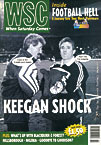 Bribe scandals are the in thing in European football, not least in Portugal, as Phil Town reports
Bribe scandals are the in thing in European football, not least in Portugal, as Phil Town reports
FC Porto may have cruised comfortably into the last eight of the Champions League, but their apparent health and vigour belies a domestic game lurching from scandal to scandal.
Early in October their coach, former Portuguese national team boss Antonio Oliveira, had an ‘off-the-record’ chat with a group of eight journalists, which was subsequently published verbatim by the football daily, Record. “I’m always being accused of things I don’t do,” he said, “But put yourselves in my place and see how you would react . . . if I knew I was going to die tomorrow, I’d get in my car with a machine gun and fuck a dozen blokes up a treat!”
Oliveira also admitted that he is in possession of a forged rubber stamp allegedly used in 1987 to falsify the international pass of a Zairean midfielder so that he could play for Vitoria Guimaraes, then trained by Oliveira.
In the second week of November, Fernando Barata, currently president of third division club Imortal, announced that on behalf of FC Porto president Jorge Nuno Pinto da Costa he ‘bought’ the Romanian referee, Ion lgna, before one of the semi-final legs of the Cup-Winners Cup tie against Aberdeen in 1984. Porto went on to reach the final. “Football is a lie,” Barata said, “Results are arranged and agreed on. Why is it that people don’t present proof of this, or why is there no proof ? Because there’s a Mafia living off football, that’s why.”
The case is currently in the hands of UEFA and disciplinary action may result. No legal action can be taken in Portugal against any of the parties since, luckily for all, the case is past its sell-by date.
On 21st November, the Attorney General, the director of the Special Branch and the Minister of Justice met to discuss the state of Portuguese football. The latter announced that the SB are to be given extra resources to combat corruption in sport. He revealed that there are ten cases of this currently under investigation.
The next day, league clubs met to among other things elect a new leader (Pinto da Costa is standing down). The president of the refereeing commission resigned in the wake of the revelation of alleged comments he made to a referee who disallowed a Porto goal in an away match against Belenenses (the ref was told that Pinto da Costa had been very angry, and that if he had only shut his eyes he would probably have been president of the refereeing commission himself by now).
Valentim Loureiro, the president of Boavista, a club from Porto, was voted in as president, but not before the presidents of the two big Lisbon clubs had walked out. It was also decided to introduce a system of choosing referees for games by draw, as opposed to on the basis of best man for a particular job, given his declared club affiliations. The draws are to be made live on TV, though it’s yet to be seen if the new system curbs the constant calls of ‘cheat’ from officials of teams who have lost (but I doubt it !)
But these are just the peaks of a range of scandals thrown up in recent months; there are many rocky ridges in between. At the beginning of December, for example, national coach Artur Jorge called that most emblematic club, Benfica, “a circus”. Gaspar Ramos, head of the football department at the club, called the ex-Benfica coach, he of the bogbrush moustache and recent brain operation, “a clown”. And as I write, the Football Federation is in the spotlight after mislaying a great lump of money allocated by UEFA to Benfica to put new seats in their stadium.
Why the avalanche? Well, it seems that there’s more corruption in the game here than in most countries. But it’s also true that public thirst for these stories has grown insatiable with the relatively recent novelty of three national sports papers every single day and two extra national TV channels, one of which is populist in the extreme.
There are two ways of looking at the fact that most of the stories seem to involve FC Porto: either they’re as guilty as sin most of the time, a view shared by most in the south, or, as the ubiquitous and radically regionalist Pinto da Costa would have us believe, they’re the victims of a rabid southern press (and government) driven by hatred and jealousy.
What is a fact is that Portuguese football is in a bad way, even worse when it’s held up against the English, Italian and Spanish games. The latter especially has won lots of fans with its televised thrills and, er, Portuguese stars. Indeed, in the last game the national team played, there were only four home-based players in the side. Crowds have dropped by two thirds in the past couple of years, and although we’re only just past Christmas, FC Porto are near as dammit champions again, such is their lead at the top and the fragility of the rest of the pack. But Manchester United – or the magistrates – could still spoil their season.
From WSC 120 February 1997. What was happening this month